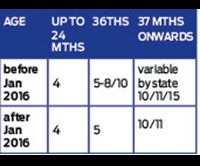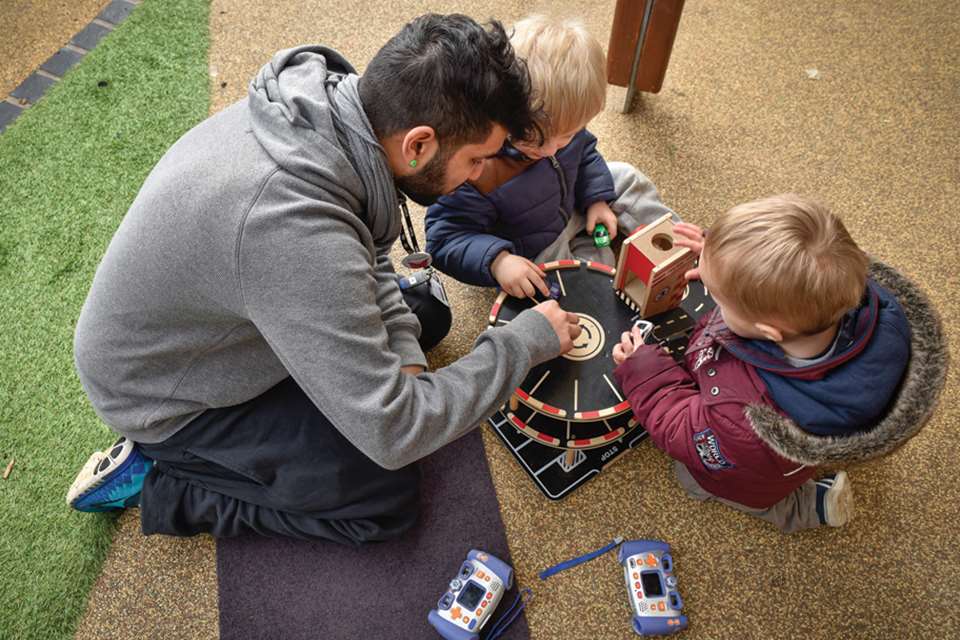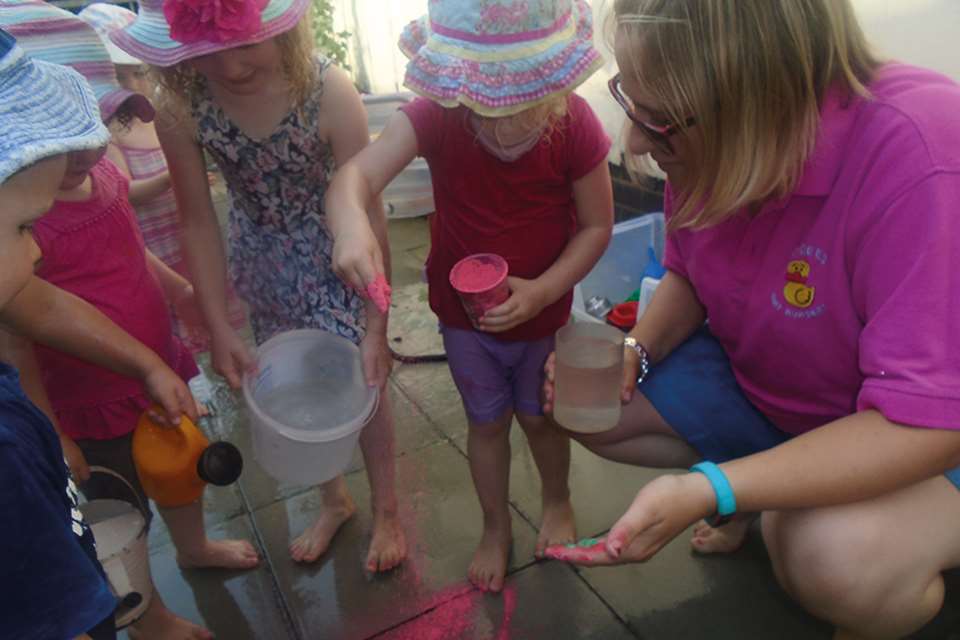Professional Development - Proof positive
Professor Iram Siraj and Dr Denise Kingston
Monday, May 27, 2019
A study in Australia has shown the benefits of evidence-based training for children and staff. By Professor Iram Siraj and Dr Denise Kingston

Download the PDF of this article
Can staff training be a waste of money, or might it be the best investment that any early years provision can make?
No early childhood education and care (ECEC) provider wants to waste money on a course that won’t make a scrap of difference to the quality of their provision. But it’s hard to know in advance whether or not a session will be relevant and delivered by a well-qualified trainer – within the current glut of ECEC training, much of it is not evidence-based and some is not delivered by adequately qualified trainers.
A LESSON FROM AUSTRALIA
 In Australia, the New South Wales Department of Education (NSW DoE) decided to investigate this dilemma by funding the Fostering Effective Early Learning (FEEL) project. The move was in response to the growing body of evidence that high-quality ECEC services really do deliver long-term benefits to children and society.
In Australia, the New South Wales Department of Education (NSW DoE) decided to investigate this dilemma by funding the Fostering Effective Early Learning (FEEL) project. The move was in response to the growing body of evidence that high-quality ECEC services really do deliver long-term benefits to children and society.
Through the study, NSW DoE aimed to learn whether a bespoke PD course made any difference to ‘the quality of curricula and interactions in early childhood education and care (ECEC) services’ (that is, in pre-schools and long-day care in New South Wales).
Following a literature review, the FEEL team of international academics, led by Professor Iram Siraj, designed the Leadership for Learning PD programme for early childhood staff.
It was then piloted at 90 carefully selected NSW centres, so enabling the team to compare their outcomes across a range of locations, socio-economic advantage indices, National Quality Standard (NQS) ratings (NSW pre-school inspections) and service types.
The programme was designed to:
- enhance the quality of educational and social-emotional experiences for young children by addressing the knowledge, skills and attitudes of staff in key areas
- cover the foundational principles of child learning and development (including self-regulation, literacy, numeracy, science and critical thinking)
- provide a cascading model of delivery, so participants could share their new knowledge with colleagues and families.
The results were very positive, with the programme improving practice in areas of the curriculum, adult-child interactions and outcomes for children in key domains (see below).
Importantly, the programme indicates the extent and breadth of positive outcomes that can be achieved through high-quality, evidence-based PD for ECEC staff by highly qualified and experienced trainers.
LEADERSHIP FOR LEARNING
We developed the programme after analysing the weaknesses in existing practice, which were detected through an analysis of Sustained Shared Thinking and Emotional Well-being (SSTEW, Siraj et al 2015) and Early Childhood Environment Rating Scale – Extension (ECERS-E, Sylva et al 2010) scores across hundreds of centres in the UK and Australia.
In particular, the programme focused on improving the quality of interactions with children, on fostering their social well-being, and on supporting their concept development within curricula (maths, language, etc.). We delivered the training, along with Dr Cathrine Neilsen-Hewett, over nine months in three phases:
Phase 1 Two intensive, face-to-face days on the aspects and evidence supporting quality in ECEC. An introduction to the SSTEW and ECERS-E scales for practice development and reflection.
Phase 2 Five fortnightly half-day sessions (of four hours each), which focused on foundational principles of child learning and development; that is:
- self-regulation and social-emotional development
- language and literacy
- science and critical thinking
- mathematics and early numeracy development
- leadership and assessment.
This gave the participants a chance to apply the course content to their practice and to discuss the impact at the next fortnightly session.
Phase 3 Over the nine-month course, participants had access to online support which provided PowerPoint presentations, video clips, notes and resources, and facilitated discussions in settings.
Before rolling out the programme in the 90 centres (with a total of 1,346 three- to five-year-olds), the FEEL team rated centre quality and child development (i.e. language, numeracy and self-regulation) in all the settings involved. Half the centres (the intervention group) underwent the nine-month PD course in 2016, while the other half (the control group) continued their usual practice and completed the PD in 2017 – after the FEEL team had repeated their ratings of the intervention group.
IMPROVEMENTS
The FEEL team evaluated the content and delivery of the PD and the 45 ‘intervention centres’ showed the following improvements:
Pedagogical leadership
There were significant improvements in the quality of pedagogy (for example, in early language development, pre-literacy and mathematics) and in interactions (for example, sustained shared thinking, supporting social-emotional well-being).
While the ‘control group’ (before undergoing the PD) stayed on average at similar or worse quality levels over the year, the ‘intervention group’ improved significantly in areas of curricular and interactional quality.
Child outcomes
Children in the ‘intervention centres’:
- had twice the growth in verbal comprehension as their counterparts in the ‘control group’
- showed a significant improvement in their numeracy development (more than would be expected in normal development) on two separate measures – 23 per cent greater gains in number concepts, and 28 per cent gains in early numeracy
- demonstrated improved socio-emotional development, with a reduction in reported internalising behaviours (that is, fewer emotional and peer problems).
Participants
Participating staff reported:
- increased sense of purpose and extending themselves to incorporate concepts and ideas covered in the programme
- a deeper understanding of child development, the evidence base underpinning effective practice and their role in influencing outcomes
- improved capacity to share information with families, colleagues and the broader community.
The scale of the changes was, unsurprisingly, linked to attendance and the degree to which the centres embraced the PD. Some participants observed changes within a few weeks – several commented that ‘taking a step back and observing children’ had made a large impact – and the beneficial changes accrued as the programme developed.
One practitioner commented, ‘Confidence is improving over time, and was the main issue to making changes within our service. [We made] small changes at the beginning, and now we are more inclined to make huge changes across each room.
‘We had staff resistant to change, and eventually lost two of our 26 as a direct result of the changes made. Three others did not initially see the value in improving the educational practices of staff, but have seen good results over time and heard good feedback, which has resulted in them changing practices and even promoting them now.’
Quality practice
Eighty-one of the 90 staff surveyed reported changes among the children in their care due to the PD. Of these, 60 per cent commented on children’s increased engagement and problem-solving; 43 per cent on children asking more questions; and 19 per cent on children being more confident in interactions.
Many commented on children:
- taking charge of their own learning
- being part of smaller groups
- being engaged in more meaningful learning experiences and sustained shared thinking.
One practitioner said, ‘Sustained shared thinking – wow! The other day, while I was involved in a small group activity about measurement, I thought, “Is this really happening?” Through my initial question, the children began supporting and extending each other, and then asked me to lie on the ground to measure objects against my height – before they began ordering them to determine which would be most suitable to retrieve a toy [from] over the fence.
‘I was delighted by the way they worked together in their thinking. As problems arose, all the children were utilised and listened to within the group.’
Family engagement
A few participants noted little to no changes for families as a result of the PD – with contributing factors including families’ lack of interest, parents’ work schedule preventing engagement, and practitioners’ uncertainty about how to filter information through to families.
Most participants, however, reported enhanced engagement with their children’s families, with many staff providing strategies to support parent-child interactions and engage in their children’s learning – such as using ‘yarn bags’ to bring home, holding evening events about self-regulation, and posting information about the PD on the centre’s Facebook site.
As a result, parents had:
- noticed changes in their children
- given positive feedback (28 per cent of staff had received positive comments)
- indicated a greater understanding of their children’s learning – particularly recognising the staff’s role in their child’s development (i.e. beyond ‘baby-sitting’) and the importance of high-quality early childhood practice.
IMPLICATIONS
The study confirms that investing properly in sustained, top-quality staff training really does make a lasting difference and is a sure path to a higher-quality service. It should help staff to understand the value for them, and their children, of their participation in ongoing professional development. And, most important of all, it urges training providers to shape their offerings on the strong evidence of internationally researched best pedagogical and professional development practice.
CASE STUDY: Waratah Cottage Early Learning Centre
‘We work in a low socio-economic area with families who may be single parents, have drug issues, experience domestic violence or alcoholism, and a whole range of low-educated parents – some who are not able to read or write. It’s a challenging area and we need to be highly skilled, but we love it,’ says Kyle Barlow, nominated supervisor at Waratah Cottage Early Learning Centre in Claymore, New South Wales.
‘We are a local government service, so we have always been lucky to have a wide variety of training with lots covering attachment theory, brain development and self-regulation. Before we participated in the FEEL study, our management became interested in Reggio Emilia practices, and we started to move more towards play-based learning and to be more child-led. This way of learning was very different from the structured group learning that we’d done previously.
‘We found it difficult as educators and were worried that we were not doing enough for the children. On reflection, I feel we had not done enough professional development around play-based learning, and we were floundering when the opportunity to join the FEEL study arose around four years ago. We were really excited to be able to talk more about child development and get current information on how children learn.’
Relational pedagogy
‘We were fortunate to be supported by the council to release three of us to attend the training. A lot of other centres only released one or two people and I feel they struggled to implement what they had learned in practice in their services. I was able to explain to my staff about what we’d learned, set expectations and they were also able to see it happen in the service with the two educators acting as role models, supporting and praising. More people undertaking the training meant that we could really push it.
‘We started the FEEL study by attending the University of Wollongong for two full days of training. This was followed up by five fortnightly half-day visits to the university and we ended with a day of reflection. I liked that we had time to come back to our service and reflect on our practice and implement changes. It meant that we were able to slowly introduce new things every fortnight so staff did not feel overwhelmed.
‘We could use our training to critically look at our practice and implement change. Self-regulation was not a major part of the training for us because we were already strong in that area, but it was evident we were behind on the education elements, such as maths, language, science and critical thinking.’
Intentional pedagogy
‘Previously we had used simplified language for the children because we thought it was the right thing to do, but we learnt that by widening our vocabulary it meant children heard more language. This enables them to pick up more words and impact on their reading ability at a later stage.
‘Instead of working with large groups, we worked with groups of around five children. This enables them to be more engaged and we can ask the children lots of questions and give them time to think and problem-solve instead of just giving them the answers.
‘We received lots of feedback from families saying that their children kept asking questions at home. This was really good to hear because it meant that we were on the right track – their little minds were working really hard and we had piqued their curiosity.
‘We had not done much maths and science with the children because we thought it was too above them, but the FEEL study got us to do this, such as subitising, which we’d not realised children could do at such a young age. We introduced the children to science experiments and encouraged them to hypothesise what would happen and why. They love it.
‘The children are still learning through play, but it is now more intentional and structured than before. The children are displaying great levels of curiosity to the point that you can see that they are eager to learn and hungry for more information. We hadn’t had that before the FEEL study.
‘The educators have more sense of purpose and it has brought them back to life because they can really see the impact that their teaching is having on the children. It’s amazing to see the children engaged in their learning and problem-solving together.
‘Two years ago, the National Quality Framework rated us Excellent, which is the highest rating in Australia. We feel this is credit to the FEEL study and we are eternally grateful. For children in a low socio-economic area to have high outcomes blows us away.’
MORE INFORMATION
- The FEEL team comprised: Professor Iram Siraj, Dr Denise Kingston, Dr Catherine Neilsen-Hewett, Dr Steven Howard, Professor Edward Melhuish, Professor Marc de Rosnay, Dr Elisabeth Duursma and Dr Betty Luu
- A review of the current international evidence considering quality in early childhood education and care programmes – in delivery, pedagogy and child outcomes is at: https://bit.ly/2FaVG9G
- Fostering Effective Early Learning Study, https://bit.ly/2W5lD73
- Assessing Quality in Early Childhood Education and Care: Sustained Shared Thinking and Emotional Well-being (SSTEW) Scale for 2–5-year-olds provisionby Siraj, Kingston and Melhuish (2015)
- ECERS-E: The Early Childhood Environment Rating Scale Curricular Extension to ECERS-Rby Sylva, Siraj-Blatchford and Taggart (2010)









